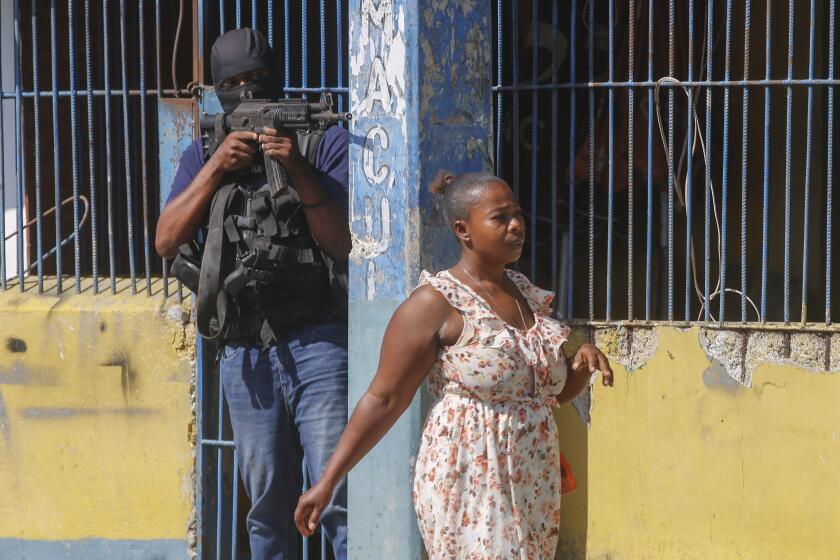Why is Haiti so chaotic? Leaders used street gangs to gain power. Then the gangs got stronger

- Share via
Haiti’s prime minister has said he will resign, bowing to international pressure to save his homeland gripped by violence and controlled by heavily armed gangsters. And amid bickering, Caribbean and U.S. officials are working with local leaders to establish a transitional council to find new leadership for the embattled country.
The West’s first free Black republic has long struggled with poverty, the legacy of colonialism, widespread deforestation, and European and U.S. interference. However, a series of experts say another cause for the latest spasm of violence is more recent: Haitian rulers’ increasing dependence on street gangs.
What is going on in Haiti?
Haiti hasn’t had a standing army or a well-funded and robust national police force for decades.
United Nations and U.S. interventions have come and gone. Without a solid tradition of honest political institutions, Haitian leaders have been using armed civilians as tools for exercising power.
Now, the state has grown fatally weak and gangs are stepping in to take its place.
Gang leaders, surreally, hold news conferences. And many see them as future stakeholders in negotiations over the country’s future.
Powerful armed gangs that control 80% of the capital are demanding a say in the future of the country under siege.
How did Haiti get here?
A 1990s embargo was imposed after the military overthrew President Jean-Bertrand Aristide. The embargo and the international isolation devastated the country’s small middle class, said Michael Deibert, author of “Notes From the Last Testament: The Struggle for Haiti,” and “Haiti Will Not Perish: A Recent History.”
After a U.S.-backed U.N. force pushed out the coup’s leaders in 1994, a World Bank-sponsored structural adjustment led to the importation of rice from the U.S. and devastated rural agricultural society, Deibert said. Boys without work flooded into Port-au-Prince and joined gangs. Politicians started using them as a cheap armed wing. Aris-tide, a priest-turned-politician, gained notoriety for using gangsters.
In December 2001, police official Guy Philippe attacked the National Palace in an attempted coup and Aristide called on the gangsters to rise from the slums, Deibert said.
“It wasn’t the police defending their government’s Palais Nacional,” remembered Deibert, who was there. “It was thousands of armed civilians.”
“Now, you have these different politicians that have been collaborating with these gangs for years, and ... it blew up in their face,” he said.
The prime minister in violence-plagued Haiti has agreed to resign once a transitional council is created.
How did weak foreign intervention hurt Haiti?
Many of the gangs retreated in the face of MINUSTAH, a U.N. force established in 2004.
Rene Preval, the only democratically elected president to win and complete two terms in a country notorious for political upheaval, took a hard line on the gangs, giving them the choice to “disarm or be killed,” said Robert Fatton, professor of government and foreign affairs at the University of Virginia.
After his presidency, subsequent leaders were at best easy on the gangs and at worst tied to them, he said.
Fatton said every key actor in Haitian society had their gangs, noting that the current situation isn’t unique, but that it has deteriorated at a faster pace.
“For the last three years, the gangs started to gain autonomy. And now they are a power unto themselves,” he said, likening them to a “mini-Mafia state.”
“The autonomy of the gangs has reached a critical point. It is why they are capable now of imposing certain conditions on the government itself,” Fatton said. “Those who created the gangs created a monster. And now the monster may not be totally in charge, but it has the capacity to block any kind of solution.”
How does gang money hurt Haiti?
The gangs, along with many Haitian politicians and business people, earn money from an illicit brew of “taxes” gleaned through extortion, kidnappings and drugs and weapons smuggling, Fatton said.
“There are all kinds of criminal networks in the area,” he said.
After Preval, gangs, politicians and business people extracted every dollar they could, said Francois Pierre-Louis, a professor of political science at Queens College at the City University of New York.
“It was open house for gangs, drugs; the country, basically ... became a narco-trafficking state,” he said. “Basically, the gangs got empowered; and not only they got empowered, they had state protection, politicians protecting them.”
More to Read
Sign up for Essential California
The most important California stories and recommendations in your inbox every morning.
You may occasionally receive promotional content from the Los Angeles Times.















